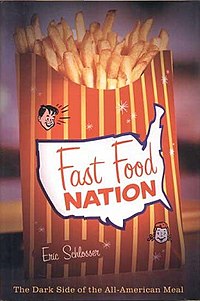Fast Food Nation

Paperback cover
|
|
| Author | Eric Schlosser |
|---|---|
| Translator | Spanish |
| Country | United States |
| Language | English |
| Subject | Fast food |
| Genre | Non-fiction |
| Publisher | Houghton Mifflin |
|
Publication date
|
January 17, 2001 |
| Pages | 288 pp |
| ISBN | |
| OCLC | 45248356 |
| 394.1/0973 21 | |
| LC Class | TX945.3 .S355 2001 |
Fast Food Nation: The Dark Side of the All-American Meal (2001) is a book by investigative journalist Eric Schlosser that examines the local and global influence of the United States fast food industry.
First serialized by Rolling Stone in 1999, the book has drawn comparisons to Upton Sinclair's classic muckraking novel The Jungle (1906). The book was adapted into a 2006 film of the same name, directed by Richard Linklater.
The book is divided into two sections: "The American Way", which interrogates the beginnings of the Fast Food Nation within the context of post-World War II America; and "Meat and Potatoes", which examines the specific mechanisms of the fast-food industry, including the chemical flavoring of the food, the production of cattle and chickens, the working conditions in the beef industry, the dangers of eating meat, and the global context of fast food as an American cultural export.
Fast Food Nation opens with a discussion of Carl N. Karcher and the McDonalds brothers, examining their roles as pioneers of the fast-food industry in southern California. This discussion is followed by an examination of Ray Kroc and Walt Disney's complicated relationship, as well as each man's rise to fame. This chapter also considers the intricate, profitable methods of advertising to children. Next, Schlosser visits Colorado Springs, CO and investigates the life and working conditions of the typical fast-food industry employee: fast-food restaurants have among the highest employee turnover rates and pay minimum wage to a higher proportion of their employees than any other American industry.
The second section of the text begins with a discussion of the chemical components that make the food taste so good. Schlosser follows this with a discussion of the life of a typical rancher, considering the difficulties presented to the agricultural world in a new economy. Schlosser is perhaps most provocative when he critiques the meatpacking industry, which he tags as the most dangerous job in America. Moreover, the meat produced by slaughterhouses has become exponentially more hazardous since the centralization of the industry: the way cattle are raised, slaughtered, and processed provides an ideal setting for E coli to spread. Additionally, working conditions continue to grow worse. In the final chapter, Schlosser considers how fast food has matured as an American cultural export following the Cold War: the collapse of Soviet Communism has allowed the mass spread of American goods and services, especially fast food. As a result, the rest of the world is catching up with America's rising obesity rates.
...
Wikipedia
